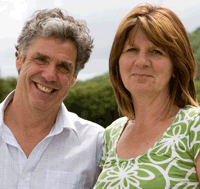FW Awards 2009: Sheep Farmer of the Year finalist – Chris and Caroline Hodgkins

When foot-and-mouth struck in 2001, movement restrictions meant outdoor lambing was the only option for Chris and Caroline Hodgkins at Locks Farm, Washington, on West Sussex’s South Downs.
“We were lambing our Dorsets all over the place,” Mr Hodgkins recalls. “We could see outdoor lambing was the right system but we needed the right breed.”
Being first generation farmers, Mr and Mrs Hodgkins were probably at something of an advantage in not having a strong breed allegiance. “Over the next two years the Dorsets and Mules went in favour of Romneys,” Mr Hodgkins says.
Because they were looking to build up a Romney flock quickly on their 1400 tenanted acres, and because they couldn’t be in control of the breeding of available UK stock, they looked to New Zealand genetics. “We were after a very maternal ewe. The New Zealanders were doing what we wanted to do,” Mr Hodgkins says.
“They were already recording under an easycare system. We came up with three or four bloodlines we were interested in. We’ve bought years of breeding by going to New Zealand.”
Splitting their flock into four distinct groups, the Hodgkins have been able to focus on selling both breeding stock and fat lambs.
Flock A, the nucleus pedigree flock, comprises 1000 7/8ths NZ genetics ewes. The flock is Signet SRS performance recorded with the top males sold to pedigree and commercial producers with the remaining females transferred to the commercial flock – flock B.
The third grouping is mated to high EBVHampshire Downs for fat lamb finishing, and the fourth is a purebred flock of Hampshire Down ewes.
Quality genetics are a mainstay of the business. Flock A is a joint venture with the top Romney ram breeder in New Zealand. “We’ve used the JV to get the genetics we wanted as he wouldn’t sell us his genetics outright,” Mr Hodgkins explains.
Developing the genetic lines in the flocks has been a significant investment, he accepts. “If we weren’t doing the NZ genetics and just selling fat lambs we’d be £5 a ewe better off, but we’re still in the process of putting the money up front. In three to five years’ time we’ll have paid it off and then it will grow.”
Most of the flock A tups are sold from home, but the Hodgkins accept they will have to “get out” to some of the bigger events to market what they are doing.
Flock health is carefully monitored and internet research works well with veterinary advice in support, says Mrs Hodgkins. The flock is FABBL assured.
Farming on the South Downs comes with its challenges. “Manipulating grazing is an issue,” Mr Hodgkins says. “The vast majority is an ESA. We can’t spray and we can’t fertilise.”
The land is also in eight main blocks owned by six landlords with rents being paid according to who receives the environmental payments and the single farm payment.
And being in such a popular and beautiful area, means there’s the public to deal with too. “It’s a challenge and an asset,” he continues. “You’re in the public eye a lot.”
There’s no doubt the Hodgkins are a team and along with their staff they have a clear vision about their business and the industry.
“I’m very optimistic,” Mr Hodgkins enthuses. “I’m big into performance recording. Why would you trust your future to an animal you don’t know the potential of?”
Farm Facts
- 1400 tenanted acres of which 1200 acres managed within the South Downs ESA disallowing fertilisers or agrochemicals
- Land in eight main blocks
- 3000 pure Romney ewes and 24 pedigree Hampshire Down ewes outdoor grazed throughout year and outdoor lambed
- All stock bluetongue vaccinated
- 50 pedigree Sussex cows
What the judges liked:
- Great team working – the staff are as important as the management
- Managing a challenging environment – working well with the public and environmental agreements
- Brought in new genetics and using recording to aid genetic progress with use of big ear tags for easier visual management
